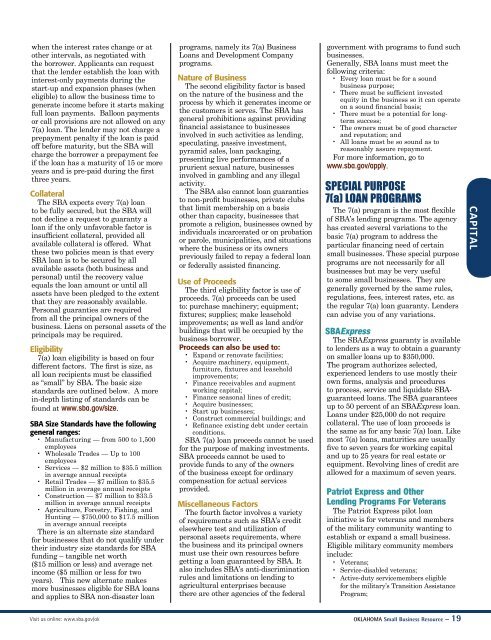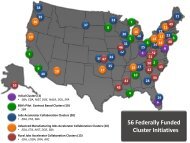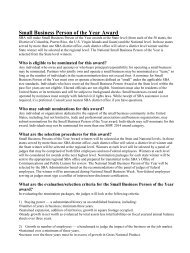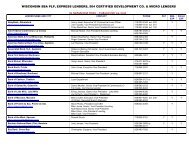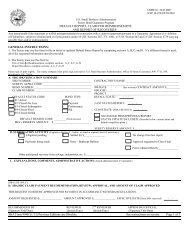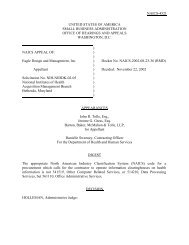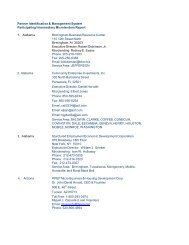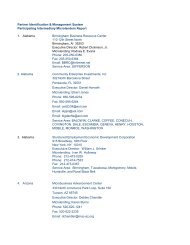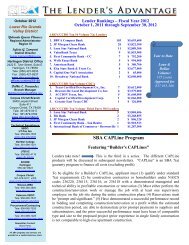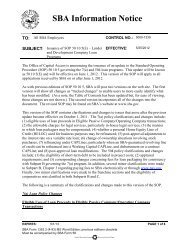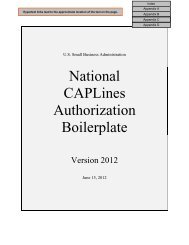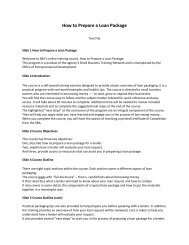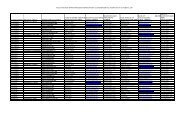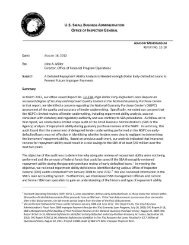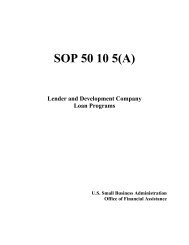Oklahoma Small Business Resource Guide - SBA
Oklahoma Small Business Resource Guide - SBA
Oklahoma Small Business Resource Guide - SBA
Create successful ePaper yourself
Turn your PDF publications into a flip-book with our unique Google optimized e-Paper software.
when the interest rates change or at<br />
other intervals, as negotiated with<br />
the borrower. Applicants can request<br />
that the lender establish the loan with<br />
interest-only payments during the<br />
start-up and expansion phases (when<br />
eligible) to allow the business time to<br />
generate income before it starts making<br />
full loan payments. Balloon payments<br />
or call provisions are not allowed on any<br />
7(a) loan. The lender may not charge a<br />
prepayment penalty if the loan is paid<br />
off before maturity, but the <strong>SBA</strong> will<br />
charge the borrower a prepayment fee<br />
if the loan has a maturity of 15 or more<br />
years and is pre-paid during the first<br />
three years.<br />
Collateral<br />
The <strong>SBA</strong> expects every 7(a) loan<br />
to be fully secured, but the <strong>SBA</strong> will<br />
not decline a request to guaranty a<br />
loan if the only unfavorable factor is<br />
insufficient collateral, provided all<br />
available collateral is offered. What<br />
these two policies mean is that every<br />
<strong>SBA</strong> loan is to be secured by all<br />
available assets (both business and<br />
personal) until the recovery value<br />
equals the loan amount or until all<br />
assets have been pledged to the extent<br />
that they are reasonably available.<br />
Personal guaranties are required<br />
from all the principal owners of the<br />
business. Liens on personal assets of the<br />
principals may be required.<br />
Eligibility<br />
7(a) loan eligibility is based on four<br />
different factors. The first is size, as<br />
all loan recipients must be classified<br />
as “small” by <strong>SBA</strong>. The basic size<br />
standards are outlined below. A more<br />
in-depth listing of standards can be<br />
found at www.sba.gov/size.<br />
<strong>SBA</strong> Size Standards have the following<br />
general ranges:<br />
• Manufacturing — from 500 to 1,500<br />
employees<br />
• Wholesale Trades — Up to 100<br />
employees<br />
• Services — $2 million to $35.5 million<br />
in average annual receipts<br />
• Retail Trades — $7 million to $35.5<br />
million in average annual receipts<br />
• Construction — $7 million to $33.5<br />
million in average annual receipts<br />
• Agriculture, Forestry, Fishing, and<br />
Hunting — $750,000 to $17.5 million<br />
in average annual receipts<br />
There is an alternate size standard<br />
for businesses that do not qualify under<br />
their industry size standards for <strong>SBA</strong><br />
funding – tangible net worth<br />
($15 million or less) and average net<br />
income ($5 million or less for two<br />
years). This new alternate makes<br />
more businesses eligible for <strong>SBA</strong> loans<br />
and applies to <strong>SBA</strong> non-disaster loan<br />
programs, namely its 7(a) <strong>Business</strong><br />
Loans and Development Company<br />
programs.<br />
Nature of <strong>Business</strong><br />
The second eligibility factor is based<br />
on the nature of the business and the<br />
process by which it generates income or<br />
the customers it serves. The <strong>SBA</strong> has<br />
general prohibitions against providing<br />
financial assistance to businesses<br />
involved in such activities as lending,<br />
speculating, passive investment,<br />
pyramid sales, loan packaging,<br />
presenting live performances of a<br />
prurient sexual nature, businesses<br />
involved in gambling and any illegal<br />
activity.<br />
The <strong>SBA</strong> also cannot loan guaranties<br />
to non-profit businesses, private clubs<br />
that limit membership on a basis<br />
other than capacity, businesses that<br />
promote a religion, businesses owned by<br />
individuals incarcerated or on probation<br />
or parole, municipalities, and situations<br />
where the business or its owners<br />
previously failed to repay a federal loan<br />
or federally assisted financing.<br />
Use of Proceeds<br />
The third eligibility factor is use of<br />
proceeds. 7(a) proceeds can be used<br />
to: purchase machinery; equipment;<br />
fixtures; supplies; make leasehold<br />
improvements; as well as land and/or<br />
buildings that will be occupied by the<br />
business borrower.<br />
Proceeds can also be used to:<br />
• Expand or renovate facilities;<br />
• Acquire machinery, equipment,<br />
furniture, fixtures and leasehold<br />
improvements;<br />
• Finance receivables and augment<br />
working capital;<br />
• Finance seasonal lines of credit;<br />
• Acquire businesses;<br />
• Start up businesses;<br />
• Construct commercial buildings; and<br />
• Refinance existing debt under certain<br />
conditions.<br />
<strong>SBA</strong> 7(a) loan proceeds cannot be used<br />
for the purpose of making investments.<br />
<strong>SBA</strong> proceeds cannot be used to<br />
provide funds to any of the owners<br />
of the business except for ordinary<br />
compensation for actual services<br />
provided.<br />
Miscellaneous Factors<br />
The fourth factor involves a variety<br />
of requirements such as <strong>SBA</strong>’s credit<br />
elsewhere test and utilization of<br />
personal assets requirements, where<br />
the business and its principal owners<br />
must use their own resources before<br />
getting a loan guaranteed by <strong>SBA</strong>. It<br />
also includes <strong>SBA</strong>’s anti-discrimination<br />
rules and limitations on lending to<br />
agricultural enterprises because<br />
there are other agencies of the federal<br />
government with programs to fund such<br />
businesses.<br />
Generally, <strong>SBA</strong> loans must meet the<br />
following criteria:<br />
• Every loan must be for a sound<br />
business purpose;<br />
• There must be sufficient invested<br />
equity in the business so it can operate<br />
on a sound financial basis;<br />
• There must be a potential for longterm<br />
success;<br />
• The owners must be of good character<br />
and reputation; and<br />
• All loans must be so sound as to<br />
reasonably assure repayment.<br />
For more information, go to<br />
www.sba.gov/apply.<br />
SPECIAL PURPOSE<br />
7(a) LOAN PROGRAMS<br />
The 7(a) program is the most flexible<br />
of <strong>SBA</strong>’s lending programs. The agency<br />
has created several variations to the<br />
basic 7(a) program to address the<br />
particular financing need of certain<br />
small businesses. These special purpose<br />
programs are not necessarily for all<br />
businesses but may be very useful<br />
to some small businesses. They are<br />
generally governed by the same rules,<br />
regulations, fees, interest rates, etc. as<br />
the regular 7(a) loan guaranty. Lenders<br />
can advise you of any variations.<br />
<strong>SBA</strong>Express<br />
The <strong>SBA</strong>Express guaranty is available<br />
to lenders as a way to obtain a guaranty<br />
on smaller loans up to $350,000.<br />
The program authorizes selected,<br />
experienced lenders to use mostly their<br />
own forms, analysis and procedures<br />
to process, service and liquidate <strong>SBA</strong>guaranteed<br />
loans. The <strong>SBA</strong> guarantees<br />
up to 50 percent of an <strong>SBA</strong>Express loan.<br />
Loans under $25,000 do not require<br />
collateral. The use of loan proceeds is<br />
the same as for any basic 7(a) loan. Like<br />
most 7(a) loans, maturities are usually<br />
five to seven years for working capital<br />
and up to 25 years for real estate or<br />
equipment. Revolving lines of credit are<br />
allowed for a maximum of seven years.<br />
Patriot Express and Other<br />
Lending Programs For Veterans<br />
The Patriot Express pilot loan<br />
initiative is for veterans and members<br />
of the military community wanting to<br />
establish or expand a small business.<br />
Eligible military community members<br />
include:<br />
• Veterans;<br />
• Service-disabled veterans;<br />
• Active-duty servicemembers eligible<br />
for the military’s Transition Assistance<br />
Program;<br />
Visit us online: www.sba.gov/ok OKLAHOMA <strong>Small</strong> <strong>Business</strong> <strong>Resource</strong> — 19<br />
CAPITAL


